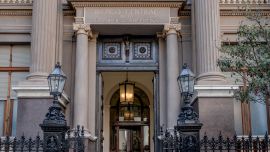Argentina’s economy contracted in the second quarter compared to the first three months of the year, as next month’s crucial midterm election looms for President Javier Milei.
Output shrank by 0.1 percent, while the median estimate of economists surveyed by Bloomberg expected 0.1 percent growth.
Compared to last year’s second quarter, the local economy grew 6.3 percent, just below the 6.5 percent expansion expected by the same survey.
Exports, retail consumption and capital investment dragged down growth, while imports fell and government consumption ticked up.
“Heightened political and market uncertainty have cast doubt over the sustainability of Milei’s macroeconomic programme, likely sparking a negative feedback loop that’s weighed on activity,” said Jimena Zuniga, geoeconomics analyst at Bloomberg.
“We don’t expect sentiment to improve substantially unless Milei’s coalition fares well in the October 26 midterm elections. That’d give his economic team more leeway to reassess and possibly relaunch its macroeconomic plan.”
The GDP print is more bad news for Milei after his party lost a key Buenos Aires Province vote by a landslide, worsening his prospects for the nationwide midterm vote scheduled for late October.
The second quarter’s drop in economic activity aligns with a consumer spending setback in recent months as wages adjusted for inflation fell into negative territory earlier in the year. Unemployment in the first quarter also reached its highest level in nearly four years.
Looking ahead, economists expect South America’s number two economy to contract in July and August as several policy moves by the Central Bank triggered a liquidity shortage that pushed real interest rates into double digits.
Economists forecast growth for the year at 4.4 percent, revised down from five percent, according to the Central Bank’s August survey.
related news
by Manuela Tobias, Bloomberg





















Comments